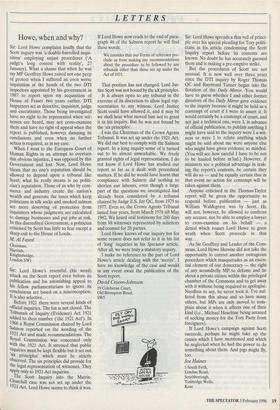Sir: Lord Howe's resentful (his word) attack on the Scott
report even before its publication and his astonishing appeal to his fellow parliamentarians to ignore its conclusions are based on a misconception. It is also selective.
Before 1921 there were several kinds of official inquiries. The list is not closed. The Tribunals of Inquiry (Evidence) Act 1921 added to their number (`the 1921 Act'). In 1966 a Royal Commission chaired by Lord Salmon reported on the wording of the 1921 Act and made recommendations. The Royal Commission was concerned only with the 1921 Act. It stressed that public inquiries must be kept flexible but it set out sot principles' which must be strictly observed. The six principles did provide for the legal representation of witnesses. They apply only to 1921 Act inquiries. The Scott Inquiry into the Matrix- Churchill case was not set up under the 1921 Act. Lord Howe seems to think it was. If Lord Howe now reads to the end of para- graph 46 of the Salmon report he will find these words:
We consider that our Terms of reference pre- clude us from making any recommendations about the procedure to be followed by any tribunals other than those set up under the Act of 1921.
That position has not changed. Lord Jus- tice Scott was not bound by the six principles.
It is always open to any tribunal in the exercise of its discretion to allow legal rep- resentation to any witness. Lord Justice Scott could have allowed it, and it may be we shall hear what moved him not to grant it in his inquiry. But he was not bound by the 'six principles'.
I was the Chairman of the Crown Agents Tribunal. It was set up under the 1921 Act. We did our best to comply with the Salmon report. In a long inquiry some of it turned out to be almost unworkable. We freely granted rights of legal representation. I do not know if Lord Howe has studied our report so far as it dealt with procedural matters. If he did he would have learnt that compliance with Salmon did nothing to shorten our labours, even though a large part of the questions we investigated had already been considered by a tribunal chaired by Judge E.S. Jay QC, from 1975 to 1977. Even so, the Crown Agents Tribunal lasted four years, from March 1978 till May 1982. We heard oral testimony for 260 days from 98 witnesses represented by solicitors and counsel for 28 parties.
Lord Howe knows of our inquiry but for some reason does not refer to it in his list of 'long' inquiries in his Spectator article. After all, we were truly a statutory inquiry.
I make no reference to the part of Lord Howe's article dealing with the 'merits'. I have no knowledge of the case and would in any event await the publication of the Scott report.
David Croon Johnson
59 Coleherne Court, Old Brompton Road, SW5


































































 Previous page
Previous page